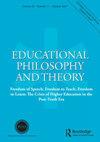Escape education
IF 1.8
4区 教育学
Q2 EDUCATION & EDUCATIONAL RESEARCH
引用次数: 4
Abstract
The aim of this short paper is to identify the conditions and political possibilities to escape education. We discuss the institutions of schooling and ‘higher education’ (universities, colleges, etc.). These institutions are commonly referred to as formalized learning spaces, and these spaces govern subjectivities through a variety of mechanisms, including pedagogies, curricula, syllabi, and assessments. We briefly review several authors’ views on formalized education. Then, we review the idea of escape as introduced in the epigraph. We take a moment to discuss escape in relation counterconduct (Foucault, 2007) and ‘fugitivity’ the state of being and becoming a fugitive (Harney & Moten, 2013). We discuss all of these ideas as ‘acts of refusal’ to the Modernist aspirations of hope that education utilizes to enact its neoliberal fantasies of reform (Ball, 2020; Clarke, 2020). We illustrate how hope and neoliberalism have combined into an attendant mode of “antiproduction” that ostensibly widens education’s own limits, rather than produce any appreciable improvements for students or society (Guattari, 1984). We argue that escape, fugitivity, and critique are all viable counter-praxes to the “autopoietic” processes of anti-production that education routinely expects, and through which the system widens its own limits (Luhmann, 1986). We conclude with an overly brief discussion of the dilemma that Claire Colebrook (2013, 2017) raises about the “risks of stupidity” for educational escapees and fugitives. What is at stake with different forms of educational escape is its ethical wager, risking what other forms of thinking and thought it portends and produces.逃避教育
这篇短文的目的是确定逃避教育的条件和政治可能性。我们讨论学校教育机构和“高等教育”(大学、学院等)。这些机构通常被称为形式化的学习空间,这些空间通过各种机制来管理主体性,包括教学法、课程、教学大纲和评估。我们简要回顾了几位作者对正规教育的看法。然后,我们回顾了铭文中所介绍的逃避的概念。我们花点时间来讨论逃避与反行为(福柯,2007)和“逃亡”(存在和成为逃亡者的状态)的关系(哈尼和莫顿,2013)。我们将所有这些想法视为对现代主义希望的“拒绝行为”,教育利用现代主义的希望来实现其新自由主义的改革幻想(Ball, 2020;克拉克,2020年)。我们说明了希望和新自由主义是如何结合成一种随之而来的“反生产”模式的,这种模式表面上扩大了教育本身的限制,而不是为学生或社会带来任何明显的改善(Guattari, 1984)。我们认为,逃避、逃亡和批判都是反生产的“自创生”过程的可行反实践,教育通常期望这种反生产过程,并通过这种过程扩大系统自身的限制(Luhmann, 1986)。最后,我们对克莱尔·科尔布鲁克(Claire Colebrook, 2013, 2017)提出的关于教育逃亡者和逃亡者的“愚蠢风险”的困境进行了过于简短的讨论。不同形式的教育逃避所面临的危险在于它的伦理赌注,它所预示和产生的其他形式的思考和思想将面临风险。
本文章由计算机程序翻译,如有差异,请以英文原文为准。
求助全文
约1分钟内获得全文
求助全文
来源期刊

Educational Philosophy and Theory
EDUCATION & EDUCATIONAL RESEARCH-
CiteScore
4.20
自引率
15.00%
发文量
171
期刊介绍:
Educational Philosophy and Theory publishes articles concerned with all aspects of educational philosophy. It will also consider manuscripts from other areas of pure or applied educational research. In this latter category the journal has published manuscripts concerned with curriculum theory, educational administration, the politics of education, educational history, educational policy, and higher education. As part of the journal''s commitment to extending the dialogues of educational philosophy to the profession and education''s several disciplines, it encourages the submission of manuscripts from collateral areas of study in education, the arts, and sciences, as well as from professional educators. Nevertheless, manuscripts must be germane to the ongoing conversations and dialogues of educational philosophy.
 求助内容:
求助内容: 应助结果提醒方式:
应助结果提醒方式:


